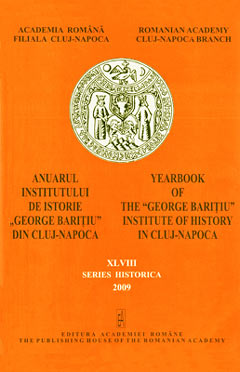Uniunea Femeilor Evanghelice din Cluj în perioada interbelică
The Union of Evangelical Women of Cluj in the Interwar Period
Author(s): Paul ŞeuleanSubject(s): History
Published by: Editura Academiei Române
Keywords: Union; Hungarian Lutherans; Evangelical women; Evangelic Church C.A.; Cluj
Summary/Abstract: The aim of the present documentary study is to provide more evidence regarding the setting up and the activity of the Magyar Evangelical Lutheran Women's Union that appeared in the interbelic period. The analysis covers the period between 1926 and the beginning of 1935. In the interbelic period, Romania had an important position as a middle state in Europe, with a role in the Ligue of Nations. In Hungary, the Magyar Evangelical Church of the Augsburg Confession (almost 430 000 members, as compared with over 1,5 million Reformed) was a product of dispersion. Planted in Reformation times, it increased under persecution. In Romania, the Reformation took hold among the German and Hungarian inhabitants of Transylvania. In 1918, after the demise of the Austrian-Hungarian monarchy, Transylvania united to Romania, in the wake of the Referendum passed at the Grand National Assembly of Alba-Iulia (the 1st of December 1918, Romania's National Day). On 8 January 1919 Transylvanian Saxons (Siebenbürger Sachsen) voted the union of Transylvania to Romania. Descendants of 12th century German settlers, Siebenbürger Sachsen retain their Evangelical Church of the Ausburg Confession, with almost 400 000 members in the 20th century. The new Statute of the German Landeskirche was adopted in the 1927s: 2 June 1927. Hungarians in Romania had a shrinking Evangelical Lutheran Church of the Ausgburg Confession in Romania (30 445 members). In 1920, Hungarians wanted to set up an episcopy but their numbers was not enough. Later they only could founded a superintendance in Arad, formed by 25 parishes. On 22 februarie 1927, Mr. Ludovic Frint, priest in Arad, was elected president of the managing boards which conducted the church. The so-called bishop was primarily the guardian of the faith and, as such, the centre of the sacramental life of the community. In Cluj, the Magyar Evangelical Lutheran Women's Union was set up on 28 January 1926 and it was essential part of the new magyar church. The goals of the Magyar Evangelical Lutheran Women's Union during 1920s-1930s were to help poor evanghelical people with gifts, wood for heating and clothes monthly; to help poor evangelical girls who wanted to marry; to give assistance for the cultural institutions of the local parish church; to help poor evangelical pupils with textbooks and notebooks. The permanent criteria of Union structure is found in the statute adopted at 13 July 1935, Cluj. According to it, the activities of the Magyar Evangelical Lutheran Women's Union were managed by the following structures: 1. the general addition; 2. the managing boards; 3. the surveillance commission; 4. office workers.
Journal: Anuarul Institutului de Istorie »George Bariţiu« - Series HISTORICA
- Issue Year: XLVIII/2009
- Issue No: 48
- Page Range: 105-119
- Page Count: 15
- Language: Romanian

